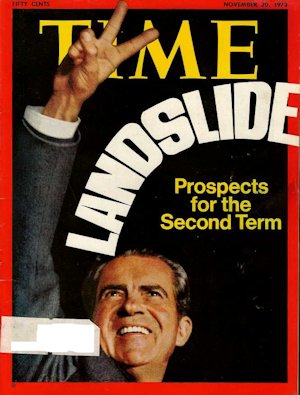The White House's White Paper Looks Awfully Red to Me
 | | I've seen the future, baby; it is murder |
I'm going to be perfectly honest with you. After September 11, I really believed that we needed to change our thinking about terrorism. When the Patriot Act came along, I read it thoroughly and defended it. I supported the invasions of both Afghanistan and Iraq. I've been fairly ambivalent about waterboarding. I don't like what's happening in Guantanamo Bay, but I understand it. When I heard that the U.S. Government executed an American citizen in Yemen with a drone strike, I sighed and wished that we'd at least canceled his citizenship first, but I wasn't truly outraged.
But now, with the leak of this so-called "White Paper," a memo that outlines our administration's internal justification for drone strikes on American citizens, I am suddenly embarassed for being so naïve. In the last week, I've found myself changing my mind about a lot of things, and the change in perspective didn't take very long. Perhaps it's been building somewhere in my subconscious, but now there's a part of me that is screaming that this has gotten way out of control, that the fabric of America is on the verge of being lost.
It's easy to think this is a partisan thing, that I wouldn't feel this way if the memo had come from a conservative administration. I can't deny that that's probably true. It's fair to say that I don't exactly look for reasons to give the Obama administration the benefit of the doubt. But let me be clear: a lot of the policy justifications being touted in the memo were started under Bush, not Obama. Certainly President Obama has taken drone warfare to ridiculous new levels, but he wouldn't have been able to go there if it weren't for President Bush. You might even be able to argue, convincingly, that we started down this slippery slope with the Patriot Act, a law I have, for the most part, been pretty okay with. If you go deep enough into the white paper, you'll find justification that dates all the way back to President Nixon's attack on Cambodia, for crying out loud. What I'm trying to say is that, even though political confirmation bias may have opened the door to my critique, it has since gone much further than a simple bitching about some Obama policy I disagree with. This isn't partisan anymore.
 | | Nixon was almost impeached and tried for his involvement in just plain old burglary, the amateur |
I'm just going to say it, flat-out, because there is no sugar-coating this. I now firmly believe that our government is guilty of murder, and that is a nearly impossible stain to wipe clean. Yes, in war there is collateral damage; people die. Yes, we have been in a de facto state of war with Islamic extremism since September of 2001. Yes, Anwar al-Aulaqi, one of the American citizens bombed into oblivion by our drones, probably deserved to die. But can we really kill an American citizen who is nowhere near a war zone without due process, hard evidence of wrong-doing or imminent danger, judicial oversight, Congressional approval, or accountability after the fact? Don't just go with a gut answer. Really think about that question.
I just can't defend it anymore. This is wrong, and we all need to have the courage to see it and to admit it. I'm not entirely sure when we crossed the line, but I have no doubts that we did. Maybe we did it right after 9/11. Maybe all that panic about the Patriot Act was justified, and many of us--myself included--were too blinded by fear and anger to recognize it. I just don't know. I really, truly don't know.
So for those of you who haven't taken a hard look at this issue, let me introduce you to Abdulrahman al-Aulaqi. He was sixteen years old when he was killed by a U.S. drone, and his only crime was being the son of Anwar al-Aulaqi. Born in Colorado, Abdulrahman spent the first half of his life in America, and expressed eagerness to return from Yemen only days before he died. Aside from his father, he had no known ties to terrorism and never publically expressed anything resembling criticism of the United States (not that that's a crime). According to his grandfather, Nasser, who is also an American citizen, "he is not a militant. He is a nice boy. He has a Facebook page, and he had a lot of friends. He is a decent boy, small boy. You know he wore glasses since he was seven years old. He’s a very gentle, soft boy."
Abdulrahman was executed by remote control. He was never charged with a crime, was never tried by a jury of his peers, never had assassination orders that were reviewed by any court, was given no warning or reprimand, and never knew that he would be targeted. On October 14, 2011, he walked into an open-air restaurant, 200 miles away from where his father was killed two weeks earlier and even farther away from the nearest American combat zone, and died along with at least six other people. Anonymous sources within the administration claim--without so much as a public apology for failing to protect American lives from American bombs--that Abdulrahman's death was a coincidental bit of collateral damage, that he wasn't the one targeted by the drone.
 | | Abdulrahman al-Aulaqi |
When asked about Abdulrahman's death last summer, former White House spokesman Robert Gibbs blithely replied, "I would suggest that you should have a far more responsible father if [you're] truly concerned about the well-being of [your] children." Current spokesman Jay Carney, just last week, defended drone strikes on American citizens, without so much as a judge's signature, as "legal, ethical, and wise."
Even under the Patriot Act, you need judicial review for a wiretap (except in the case of "roving wiretaps," in which the judge has already authorized a wiretap on an individual who then changes phones--the judicial review is not necessary for the new phone), and let's not forget that the Patriot Act is a law that went through Congress and has been reviewed multiple times by the courts. This white paper, a memo that the administration tried desperately to keep secret from not only the public but Congress, argues that the president can kill an American citizen overseas, even if he or she is outside of a war zone and poses no exigent threat to the United States, and that nobody outside of the administration has to approve the action. The legal ability to kill the citizens of your own country--without having to answer for it--is a right reserved for monarchs and tyrants, not presidents. What happened to checks and balances? If we can start impeachment hearings because the president slept with an intern, surely--surely--we can do something about this. If you ask me, though, impeachment isn't enough. We should be trying people within this administration, if not the president himself, with first degree murder.
I am willing to admit my own small share of responsibility for being so complacent and am willing to rethink my assumptions about what is necessary, what is permissible, and what is fair. I am even willing to risk being seen as a hypocrite or hopeless partisan, because that is far better than being a willing accomplice to tyranny, as defined by Miriam-Webster as "oppressive power exerted by government." The white paper, in which the executive branch grants itself the power to kill American citizens under vague limitations that it sets and defines for itself, is, by definition, tyrannical.
Wake up, America. We have to make this right before more of us end up on the kill list.
-e. magill 2/12/2013
|
|